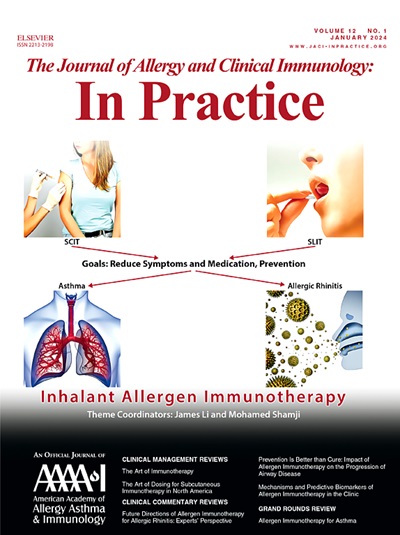Indoor Allergen Interventions in Homes and Schools for Managing Asthma
IF 8.2
1区 医学
Q1 ALLERGY
Journal of Allergy and Clinical Immunology-In Practice
Pub Date : 2025-06-01
DOI:10.1016/j.jaip.2025.04.027
引用次数: 0
Abstract
Asthma remains a prevalent and burdensome chronic disease in the United States, disproportionately affecting low-income populations and placing a significant strain on the health care system. Environmental allergen exposure, particularly in urban areas, has been extensively linked to asthma development and exacerbations. Identifying effective strategies for reducing allergen exposure could help mitigate asthma morbidity, decrease health care utilization, and improve patients’ quality of life. Studies evaluating environmental interventions, including home- and school-based allergen reduction strategies, have reported mixed results. Although some interventions, such as targeted allergen reduction, pest management, and air filtration, demonstrate improvements in asthma symptoms and health care utilization, others show limited impact on long-term asthma control and controller medication use. In this review, we assess the impact of environmental allergens on asthma prevalence, morbidity, and health care burden in the United States. We also examine the effectiveness of various allergen-reduction strategies in achieving sustained clinical benefits for asthma management and make practical recommendations for patient care.
室内过敏原干预在家庭和学校管理哮喘。
在美国,哮喘仍然是一种流行且负担沉重的慢性疾病,对低收入人群的影响尤为严重,并给医疗保健系统带来了巨大压力。环境过敏原暴露,特别是在城市地区,与哮喘的发展和恶化有着广泛的联系。确定减少过敏原暴露的有效策略有助于减轻哮喘发病率,降低医疗保健利用率,并改善患者的生活质量。评估环境干预措施的研究,包括以家庭和学校为基础的过敏原减少策略,报告了不同的结果。虽然一些干预措施,如靶向减少过敏原、有害生物管理和空气过滤,显示出哮喘症状和卫生保健利用的改善,但其他干预措施对长期哮喘控制和控制者药物使用的影响有限。在这篇综述中,我们评估了环境过敏原对美国哮喘患病率、发病率和卫生保健负担的影响。我们还研究了各种过敏原减少策略的有效性,以实现哮喘管理的持续临床效益,并为患者护理提出切实可行的建议。
本文章由计算机程序翻译,如有差异,请以英文原文为准。
求助全文
约1分钟内获得全文
求助全文
来源期刊

Journal of Allergy and Clinical Immunology-In Practice
ALLERGYIMMUNOLOGY-IMMUNOLOGY
CiteScore
11.10
自引率
9.60%
发文量
683
审稿时长
50 days
期刊介绍:
JACI: In Practice is an official publication of the American Academy of Allergy, Asthma & Immunology (AAAAI). It is a companion title to The Journal of Allergy and Clinical Immunology, and it aims to provide timely clinical papers, case reports, and management recommendations to clinical allergists and other physicians dealing with allergic and immunologic diseases in their practice. The mission of JACI: In Practice is to offer valid and impactful information that supports evidence-based clinical decisions in the diagnosis and management of asthma, allergies, immunologic conditions, and related diseases.
This journal publishes articles on various conditions treated by allergist-immunologists, including food allergy, respiratory disorders (such as asthma, rhinitis, nasal polyps, sinusitis, cough, ABPA, and hypersensitivity pneumonitis), drug allergy, insect sting allergy, anaphylaxis, dermatologic disorders (such as atopic dermatitis, contact dermatitis, urticaria, angioedema, and HAE), immunodeficiency, autoinflammatory syndromes, eosinophilic disorders, and mast cell disorders.
The focus of the journal is on providing cutting-edge clinical information that practitioners can use in their everyday practice or to acquire new knowledge and skills for the benefit of their patients. However, mechanistic or translational studies without immediate or near future clinical relevance, as well as animal studies, are not within the scope of the journal.
 求助内容:
求助内容: 应助结果提醒方式:
应助结果提醒方式:


